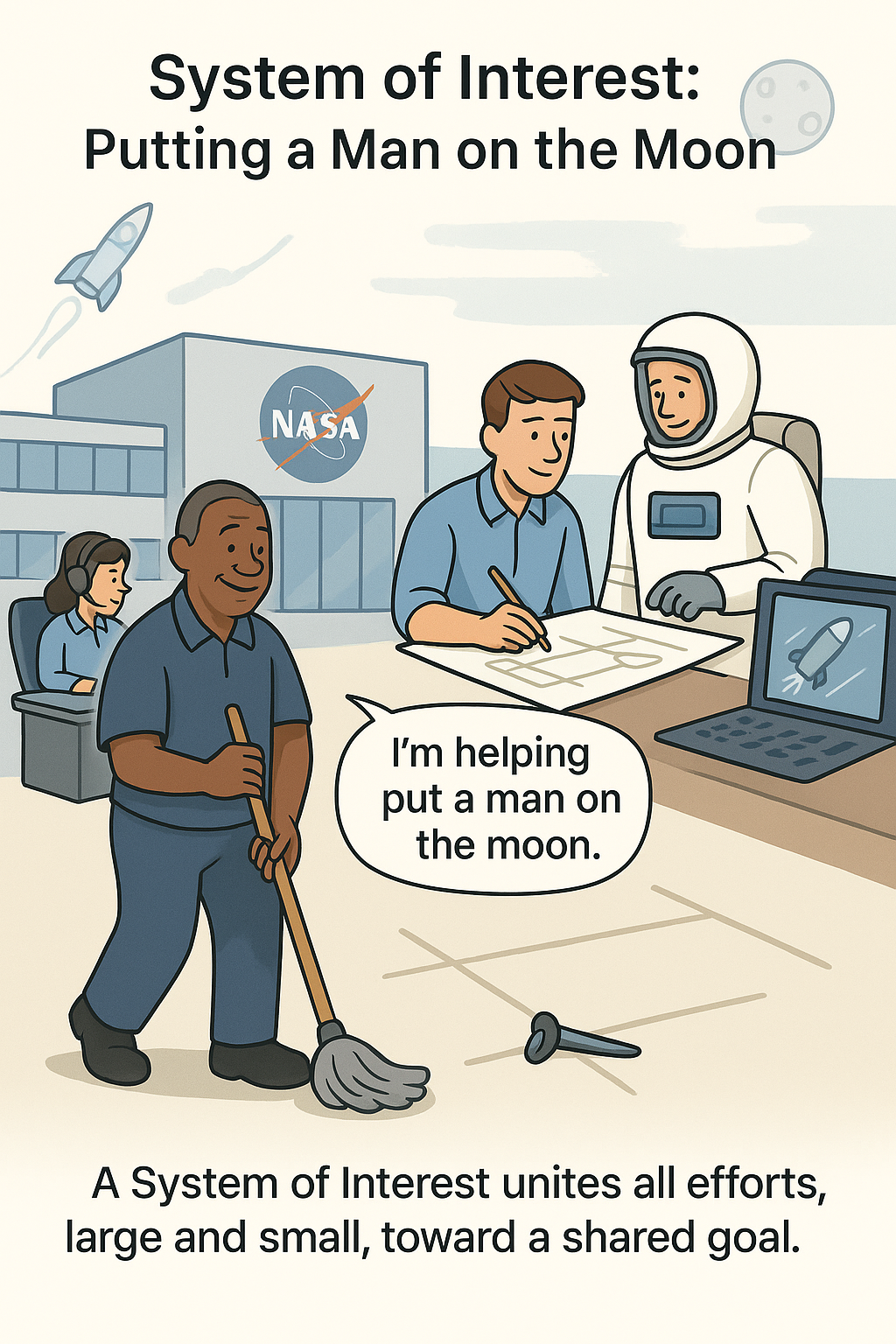System of Interest and Collective Systems Thinking
The system of interest is shared by the entire team or members of the extended enterprise! It is needed to manage collective activities and, above all, collective attention. Thanks to the concept of the "system of interest," every team member understands that they are participating in something significant, and that their individual work result is part of the work of the entire team (or the teams within the creation systems). However, each person in a role, or each department within an enterprise, may have its own system that they are creating or developing. This is called "our system."

The system of interest focuses the attention of the large system-creator team on a single, shared endeavor. There is a well-known story from 1962, when President John F. Kennedy visited NASA’s space center and asked a janitor with a mop what he was doing. “Mr. President, I’m helping put a man on the Moon.” For the janitor, by the way, "our system" would be a clean floor. He literally creates it, together with his mop, bucket, and rag.
Similarly, in a large automotive corporation like BMW, there are many teams creating the engine, the assembly line, the factory cafeteria, and so on. But for all of them, the system of interest is the "automobile." Meanwhile, "our system" for each team would be the engine, the assembly line, or the cafeteria.
The choice of the system of interest is subjective, and this responsibility falls to the entrepreneur[1], whom we will call the visionary. Of course, many team members may participate in gathering information, analysis, and decision-making, but the final word regarding the system of interest belongs to the visionary. It is the person in the visionary role who "puts their skin in the game." Many other decisions depend on their choice.
For example, Henry Ford, acting as the entrepreneur-visionary, decided that instead of a horse-drawn carriage, it was necessary to create a self-propelled vehicle[2]. After that, engineers began to consider how this system should be structured. Systems are created collectively, involving many different roles. The final structure of the system of interest—its design, function, internal organization, and so on—depends on taking into account all stakeholders, not just the visionary. However, there is no way to guarantee that the system of interest has been chosen correctly. This is the nature of entrepreneurial work: you must put forward a hypothesis and test it. You have to take on entrepreneurial risk.
Systems thinking simplifies this process, though it does not eliminate the need to propose an entrepreneurial hypothesis. Nevertheless, it helps you avoid obvious mistakes. For example, systems thinking will require you to check that the system of interest is indeed a physical system, and not just documentation or something that does not change anything important in the physical world. It will also draw your attention to the supersystem, the problems of the target audience, the needs of external project roles, and other work artifacts across different areas of interest. In essence, systems thinking offers a kind of checklist. While it does not guarantee the success of the system of interest, it is precisely this checklist that protects you from beginner mistakes[3].
It is important to note that most employees work on projects where the system of interest has already been defined[4]. Someone in the visionary role previously selected the system of interest and launched a project to create, change, or improve it. Those beginning to study systems thinking need to practice the skill of identifying the system of interest in existing businesses. Only after that, if necessary, should you take on the role of visionary[5] and independently determine the system of interest in your work and personal projects.
The word "entrepreneur" has so many different meanings that it is always better to clarify. ↩︎
Note that, at this stage, there might not even be a word yet for this system. ↩︎
And it is exactly these kinds of beginner mistakes that are most likely to occur when you are dealing with something new, complex, and unfamiliar. ↩︎
Although it often happens that a project is in full swing, but few people actually understand what the system of interest is. Nevertheless, it exists; the team members just may not be aware of it. ↩︎
And you will have to play the role of visionary, at least in your personal projects. ↩︎